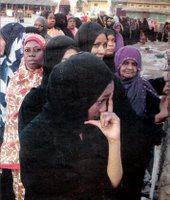Tomorrow, on October 30, Tanzania was scheduled to hold national elections for the third time since multiparty democracy was introduced in 1992. The last week has seen the final sprints in the election campaigns of the political parties, the arrival of national and international observers, and final practical preparations of the election by the National Electoral Commission (NEC). However, in the middle of Thursday's intense preparations the news arrived that the vice-presidential candidate, Rajabu Jumbe of the opposition party, Chadema, had passed away after a short period of illness. The election laws thereby required the NEC to postpone the elections by a minimum of 21 days in order to allow Chadema to nominate and introduce a new candidate. After long deliberations the NEC finally decided to postpone all national elections until December 18, including the parliamentary and local council elections scheduled for the same day.
The decision is an anti-climax for the political parties and the Tanzanian voters. It is also an economic problem as many of the processes will have to be redone in 6 weeks time. However, on the tourist paradise, yet painfully poor and politically charged, islands of Zanzibar, the election preparations continue under intense monitoring by the national and international observers. As a federal union, the elections for Zanzibari presidential post and parliament were also scheduled this weekend. These election are to be held as planned according to the Zanzibari Electoral Commission (ZEC).
In the pervious election in 1995 and 2000, Zanzibar was the only real problem for the newly created democratic system. Reports of straightforward manipulation of the results by the ruling party, CCM, led to violent demonstrations and deadly clashes with the police. The run-up to this year’s election has in many ways imitated the previous ones with similar violent incidents around election rallies and clashes with the police. There have also been reports of manipulation in the process of voter registration.
The political tension on Zanzibar stems from an almost exact split of the voters in half along ethnic and social lines stemming from the colonial days. Since the 1964 revolution the parties have been divided and the ruling party has in an obvious manner supported its own group. This has led to a deeply rooted resentment and mistrust among the population. As the opposition now are in a position to challenge the position of the ruling party, threats are made in all directions. Zanzibar's President, Amani Abeid Karume, argued during the election campaign that his party (CCM) will always be a revolutionary party unafraid of using the military. "If necessary, we are prepared to repeat the revolution from 1964." The statement was watered down the following day by the party secretary, but it still provides a good example of the intimidation tactics that are used in Zanzibar. On the other side, the main opposition party, CUF, has early in the campaign argued that they will not accept an election result that shows defeat and have threatened with riots in case this happens.
The last week before the election some of the tensions have nevertheless eased a bit and the voters register has finally been verified. The opposition has encouraged its voters to peacefully leave the polling stations and go home after casting their votes, and thereby not give the police an excuse to intervene. However, it is impossible to predict the events on election Sunday and after the presentation of the election results. The big question is how far the incumbent government is willing to go in order to remain in power, and how the opposition will react to a possible defeat. It should in relation to these troubles be mentioned that Zanzibar is a very small part of Tanzania and that only one out of Tanzania's 35 million citizens live on the islands. The Union government’s responsibility for peace on Zanzibar nevertheless remains a contested issue.
On the Tanzanian main land the situation is completely different and especially much less tense. The explanation is simply that the ruling party, CCM, by tradition have enjoyed a very clear majority of support among the population. This year the Tanzanians have nevertheless benefited from a relatively lively election race that in combination with good preparations by the NEC have provided the conditions for free and fair elections. As an example a permanent voters register has been produced that according to the NEC includes 96%, or 15.9 million of the eligible voters.
Another positive aspect is the fact that the current Tanzanian President, Benjamin Mkapa, is stepping aside after his two terms without even mentioning the possibility of a constitutional changes that could keep him in his position. This is of course rather unusual in the region in which most recently the Ugandan President Yoweri Museveni has made constitutional changes in order to further extend his 25 years of rule.
Since the almost catastrophic election in Ethiopia earlier this year, Tanzania is one of very few remaining examples of African countries moving in a both economically and politically positive direction. This means that the donor community yearly invests enormous capital for the continued development of the country. With the 40 years of economic and intellectual capital invested in Tanzania's development, it is clear that an election of violence and manipulation would be a huge disappointment as well as the sign of a failed development strategy in Tanzania and in general. This is nevertheless a point that deserves much more attention in future blogs.
/Robert Egnell




